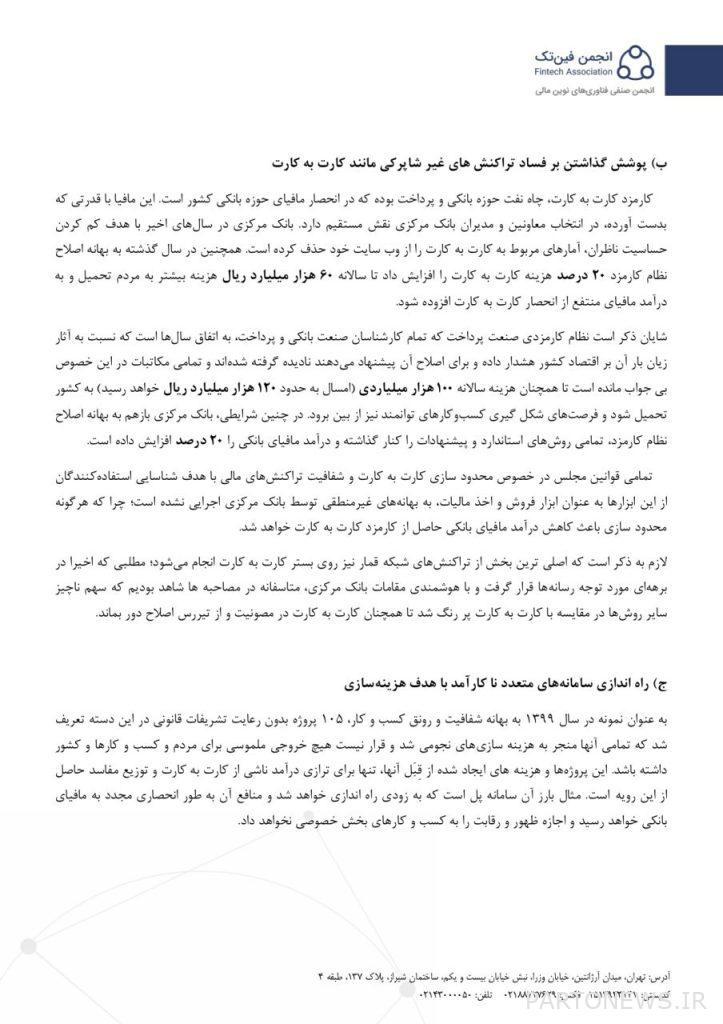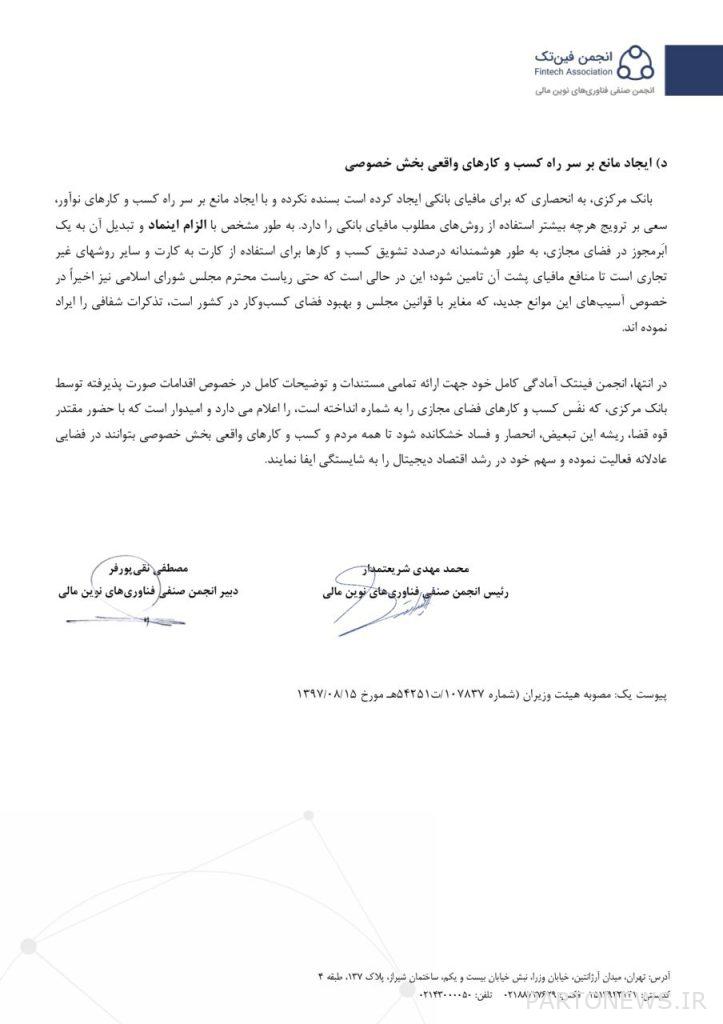The Fintech Association criticized the central bank in a letter to the head of the judiciary

The Fintech Association recently wrote a letter to the head of the judiciary criticizing the central bank’s recent actions in dealing with businesses operating in cyberspace. The Fintech Association says the central bank’s decisions have strengthened the country’s monopoly.
According to digital currency and to Quoted Since the age of the bank, the Fintech Association has written a letter to the head of the judiciary with the aim of removing obstacles from the way of the country’s entrepreneurs, in which the central bank’s decisions have strengthened the monopoly and profit of the country’s mafia gangs.
In a letter written by Mohseni Ejei, the head of the Judiciary, the Fintech Association mentioned the creation of a monopoly on the country’s payment network, covering the corruption of non-corporate transactions such as card-to-card transactions and launching various inefficient systems, the text of which is read below.
Mr. Hojjat-ul-Islam and Muslims Mohseni Ejei, Honorable Head of the Judiciary
Greetings and Regards;
Following His Excellency’s promising remarks on “dealing with mafia gangs and organized currents in bureaucracies” that have recently been reflected in the media, the Iranian Association of New Financial Technologies (FINTEC) considers it necessary to remove obstacles. Entrepreneurs of the country, to inform His Excellency about some cases.
Entrepreneurs in the country in the most difficult conditions of economic war and sanctions, by staying and trying to build and create value in the country’s economy, have really waged a great jihad. But unfortunately, we see that the actions of some managers of government agencies only strengthen the monopoly and profit of mafia gangs, the result of which is nothing but the backwardness, discouragement and despair of the country’s young entrepreneurs, which will undoubtedly encourage them to emigrate; This is something that the leader of the revolution rightly considered as an example of betrayal.
In this regard, the actions of the Central Bank, which have led to this crisis and the disappearance of opportunities for significant development of the digital economy in the country, are further summoned; In the hope that with the authoritative entry of the judiciary and the wisdom of His Holiness, we will witness the formation of a healthy and fair environment for business activities.
A) Creating a monopoly in the country’s payment network
The Central Bank has licensed only 12 companies to operate in the payment network, and even with the approval of the Cabinet of Ministers (No. 107837 / T 54251 AH, dated 08/15/1397, Article 1, paragraph b) (Appendix 1) to lift this monopoly, as well as correspondence and recommendations of associations. And the experts on the harmful effects of this monopoly have continued to silence the requests of new actors under false pretenses, and by launching licenses such as “subsidies”, they have only sought to deceive regulators about removing their monopoly and performance, if there is no equality between corporate licenses. There is no payment (PSP) (with a license price of at least 500 billion Tomans) compared to payments in terms of access to the country’s banking network infrastructure.
It should be noted that the current monopoly situation is only in favor of these 12 companies and creates many problems for banks and consumers. On the other hand, according to the decision of the Central Bank of the Central Bank, the shareholding structure of payment companies (psp) should have been amended. Mandatory fees have been collected from the country’s banks and distributed among the few shareholders of these 12 companies. This fee method was intended for the development of the payment network at the beginning of the launch; But now that the network has a penetration rate above 90%, it is no longer justified and has no results other than inflation and rent.
B) Covering the corruption of non-corporate transactions such as card-to-card
Card-to-card fees are oil wells in the banking sector and payment, which is monopolized by the country’s banking mafia. With the power it has gained, this mafia has a direct role in electing the deputies and managers of the Central Bank. In recent years, the central bank has removed card-to-card statistics from its website to reduce the sensitivity of observers. Also, last year, under the pretext of reforming the wage system, it increased the cost of card-to-card by 20% to impose 60,000 billion rials more on people annually and increase the income of the mafia that benefits from card-to-card monopoly.
It is worth mentioning that the remuneration system of the payment industry, in which all experts in the banking and payment industry have been warning for years about its harmful effects on the country’s economy and proposing to improve it, has been ignored and all correspondence in this regard has remained unanswered. The annual cost of 100,000 billion (this year will reach about 120,000 billion rials) will be imposed on the country and the opportunities for the formation of capable businesses will be eliminated. In such circumstances, the central bank has again abandoned all standard methods and offers under the pretext of reforming the fee system, and has increased the income of the banking mafia by 20%.
All the laws of the parliament regarding the restriction of card to card and the transparency of financial transactions with the aim of identifying the users of these tools as a means of selling and collecting taxes have not been implemented by the Central Bank under irrational excuses; Because any restriction will reduce the income of the banking mafia from card-to-card fees.
It should be noted that the main part of gambling network transactions is also done on a card-to-card basis; The issue that was recently covered by the media at some point, and with the intelligence of the central bank officials, we unfortunately saw in the interviews that the small share of other methods compared to card-to-card was highlighted so that card-to-card is still safe and far from correction.
C) Launching multiple inefficient systems with the aim of costing
For example, in 1399, under the pretext of transparency and business prosperity, 105 projects were defined in this category without observing legal formalities, all of which led to astronomical costs and are not supposed to have any tangible output for people, businesses and the country. These projects and the costs incurred before them are only to balance the revenue from card to card and to distribute the corruption resulting from this procedure. A clear example of this is the bridge system, which will be launched soon and its benefits will exclusively go back to the banking mafia and will not allow private sector businesses to emerge and compete.
D) Obstructing the way of real private sector businesses
The central bank is not satisfied with the monopoly it has created for the banking mafia, and by creating obstacles for innovative businesses, it is trying to promote the use of the banking mafia’s preferred methods as much as possible. Specifically by enforcing this image and turning it into a cyber-license, it is cleverly trying to encourage businesses to use card-to-card and other non-commercial methods to secure the interests of the mafia behind it; However, even the esteemed Speaker of the Islamic Consultative Assembly has recently issued clear warnings about the harms of these new obstacles, which are contrary to the laws of the Assembly and the improvement of the business environment in the country.
Finally, the Fintech Association announces its full readiness to provide all the full documentation and explanations of the actions taken by the Central Bank, which has taken the cyberspace businesses by storm, and hopes that with the strong presence of the judiciary, The root of this discrimination, monopoly and corruption should be dried up so that all people and real private sector businesses can operate in a fair environment and play their part in the growth of the digital economy.



